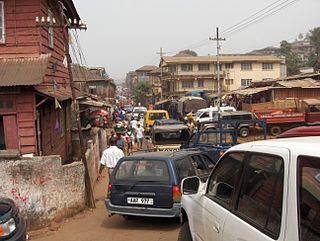
The United Nations Mission in Sierra Leone (UNAMSIL) was a United Nations peacekeeping operation in Sierra Leone from 1999 to 2006. It was created by the United Nations Security Council in October 1999 to help with the implementation of the Lomé Peace Accord, an agreement intended to end the Sierra Leonean civil war. UNAMSIL expanded in size several times in 2000 and 2001. It concluded its mandate at the end of 2005, the Security Council having declared that its mission was complete.

The United Nations Peacebuilding Commission (PBC) is a United Nations intergovernmental advisory body of both the General Assembly and the Security Council that supports peace efforts in conflict-affected countries. A key addition to the capacity of the international community in the broad peace agenda, it was established in 2005 with the passage of both A/RES/60/180 and S/RES/1645 Mr. Sérgio França Danese (Brazil) is the incumbent chair of the PBC.
The United Nations Integrated Peacebuilding Office in Sierra Leone (UNIPSIL) was established by the United Nations Security Council in 2008 to provide support to the Government of Sierra Leone in identifying and resolving tensions and threats of potential conflict, monitoring and promoting human rights, and consolidating good governance reforms. Former UN Secretary General Ban Ki Moon travelled to Freetown, Sierra Leone to mark the closure of UNIPSIL, which officially ended on 31 March 2014.

United Nations Security Council resolution 1343, adopted unanimously on 7 March 2001, after recalling resolutions on Sierra Leone and the region, including resolutions 1132 (1997), 1171 (1998) and 1306 (2000), the Council demanded that Liberia end its support for rebels in Sierra Leone and threatened the imposition of wide-ranging sanctions unless the country complied with the Security Council.

United Nations Security Council resolution 1346, adopted unanimously on 30 March 2001, after recalling previous resolutions on the situation in Sierra Leone, the Council extended the mandate of the United Nations Mission in Sierra Leone (UNAMSIL) for a further six months and increased the size of its military component.

United Nations Security Council resolution 1370, adopted unanimously on 18 September 2001, after recalling resolutions 1270 (1999), 1289 (2000), 1313 (2000), 1317 (2000), 1321 (2000) and 1346 (2001) on the situation in Sierra Leone, the Council extended the mandate of the United Nations Mission in Sierra Leone (UNAMSIL) for a period of six months until 31 March 2002, beginning from 30 September 2001.

United Nations Security Council resolution 1436, adopted unanimously on 24 September 2002, after recalling all previous resolutions on the situation in Sierra Leone, the Council extended the mandate of the United Nations Mission in Sierra Leone (UNAMSIL) for a further six months beginning on 30 September 2002.

United Nations Security Council Resolution 1938, adopted unanimously on September 15, 2010, after recalling previous resolutions on the situation in Liberia, including resolutions 1509 (2003), 1626 (2005), 1836 (2005) and 1885 (2009), the Council extended the mandate of the United Nations Mission in Liberia (UNMIL) for a further twelve months until September 30, 2011 and required it to provide electoral assistance.

United Nations Security Council resolution 1537, adopted unanimously on 30 March 2004, after recalling all previous resolutions on the situation in Sierra Leone, the council extended the mandate of the United Nations Mission in Sierra Leone (UNAMSIL) for six months until 30 September 2004 with a residual force remaining in the country until June 2005.

United Nations Security Council Resolution 1940, adopted unanimously on September 29, 2010, after recalling all previous resolutions on the situation in Sierra Leone, including resolutions 1132 (1997) and the 1171 (1998), the Council lifted an arms embargo and remaining sanctions against the country imposed in 1997.

United Nations Security Council resolution 1626, adopted unanimously on 19 September 2005, after recalling all previous resolutions on the situations in Liberia and Sierra Leone, particularly resolutions 1509 (2003), 1610 (2005) and 1620 (2005), the Council extended the mandate of the United Nations Mission in Liberia (UNMIL) until 31 March 2006 and authorised the deployment of 250 troops to Sierra Leone to protect the Special Court.

United Nations Security Council Resolution 1689, adopted unanimously on June 20, 2006, after recalling all previous resolutions on the situation in Liberia and West Africa, the Council decided to continue sanctions against the import of diamonds from the country for six months, though similar restrictions relating to timber imports were lifted.

United Nations Security Council Resolution 1712, adopted unanimously on 29 September 2006, after recalling all previous resolutions on the situation in Liberia and West Africa, particularly resolutions 1509 (2003), 1667 (2006) and 1694 (2006), the Council extended the mandate of the United Nations Mission in Liberia (UNMIL) for six months until 31 March 2007.

United Nations Security Council Resolution 1734, adopted unanimously on December 22, 2006, after recalling all previous resolutions on the situation in Sierra Leone, including resolutions 1620 (2005) and 1688 (2006), the Council renewed the mandate of the United Nations Integrated Office in Sierra Leone (UNIOSIL) until December 31, 2007.

United Nations Security Council Resolution 2005 was unanimously adopted on 14 September 2011.
United Nations Security Council Resolution 1793 was unanimously adopted on 21 December 2007.
United Nations Security Council Resolution 1886 was unanimously adopted on 15 September 2009.
United Nations Security Council Resolution 1885 was unanimously adopted on 15 September 2009.
United Nations Security Council Resolution 1829 was unanimously adopted on 4 August 2008.

United Nations Security Council Resolution 2065 was unanimously adopted on 12 September 2012.












